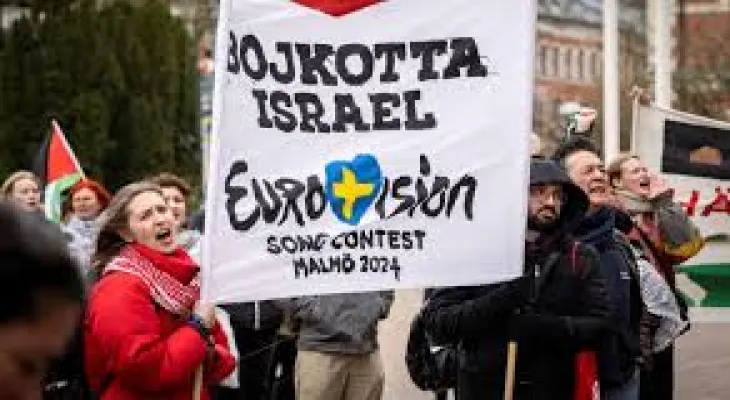Search here
Newspaper
Search here

Arab Canada News
News

Published: May 9, 2024
Not everyone in Malmö welcomed the Eurovision Song Contest in the city, as thousands of pro-Palestinian supporters demonstrated in the Swedish coastal city on Thursday against Israel's participation in the continental pop contest.
The demonstrators, waving Palestinian flags in green, white, black, and red, gathered in the historic Stortorget Square near the 16th-century Malmö City Hall before a planned march through the city to gather in a park several kilometers away from the Eurovision contest venue.
The police estimated that between 10,000 and 12,000 people participated. Among the attendees was Swedish climate activist Greta Thunberg.
The demonstrators, chanting "From the river to the sea, Palestine will be free" and "Israel is a terrorist state," set off smoke bombs in the colors of the Palestinian flag during a noisy peaceful march to criticize Israel and call for a ceasefire in Gaza, while there was a heavy police presence, with a helicopter flying overhead and officers on rooftops with binoculars.
Amani Ely Ali, a Malmö resident of Palestinian descent, said: "It's important for me to be here." "It's unacceptable for Sweden to host this Eurovision contest and for Israel to participate in it."
Demonstrator Saadallah Odeh, a Swedish citizen of Palestinian origins, stated that "this is the wrong time" for Israel's participation in the contest: "It's about songs, and songs are about love... you should be here when there is peace."
The war between Israel and Hamas, which has reportedly claimed the lives of nearly 35,000 Palestinians, according to the Gaza Ministry of Health, has cast a stark shadow over Eurovision week in Malmö. Music lovers donned colorful embroidered clothing or waved their national flags in the streets alongside supporters of the Palestinian cause wearing keffiyehs, as Palestinian flags fluttered from windows and balconies along a pedestrian street temporarily renamed "Eurovision Street."
A smaller pro-Israel demonstration was also organized on Thursday in a square in central Malmö.
Pro-Palestinian groups plan to hold another march on Saturday, the final day of the Eurovision contest.
The Israeli government has warned its citizens of "concrete concerns" about the possibility of an attack targeting Israelis in Malmö during the contest.
Contest organizers, who are trying to keep Eurovision a non-political event, have rejected calls to prevent Israel from participating due to its war against Hamas, but they requested that Israel change the lyrics of the song originally titled "October Rain," a clear reference to the Hamas-led attack across the border on October 7 that resulted in approximately 1,200 deaths, according to Israeli officials.
The song's title was changed to "Hurricane," with some of the lyrics altered, and Israeli singer Eden Golan was allowed to remain in the contest. He will compete in the semi-final on Thursday. Booing could be heard during Golan’s performance from some members of the audience who attended a rehearsal on Wednesday.
Critics of the decision to allow Israel to compete point out that Russia was expelled from the Eurovision contest in 2022 following its large-scale invasion of Ukraine, and Belarus was expelled the previous year due to the crackdown on the opposition by its government.
Anders Troll Schultz, a Malmö resident who attended the protest, said: "Music is supposed to unite us, but we are not united because Israel is participating." "I believe Malmö should have kept the Eurovision contest, but we should have told Israel: either step back, or perhaps even say, why not invite a Palestinian music group to participate? That would be fair."
Historian Dean Volkitec, author of "Post-War Europe and the Eurovision Song Contest," noted that Eurovision has long been a focal point of political disputes. Turkey's invasion of Cyprus in 1974 led to a Greek boycott the following year. Georgia withdrew from the Eurovision contest in 2009, a year after fighting a short war with Russia, when organizers rejected its proposed song, "We Don't Want to Put It," a clear reference to Russian leader Vladimir Putin.
He added: "When countries compete against each other, things become political," and Eurovision has always reflected the "spirit of the political age" in Europe. While the previous two competitions saw a significant outpouring of support for Ukraine, this year "we see Europe divided over the war in Gaza."
Comments